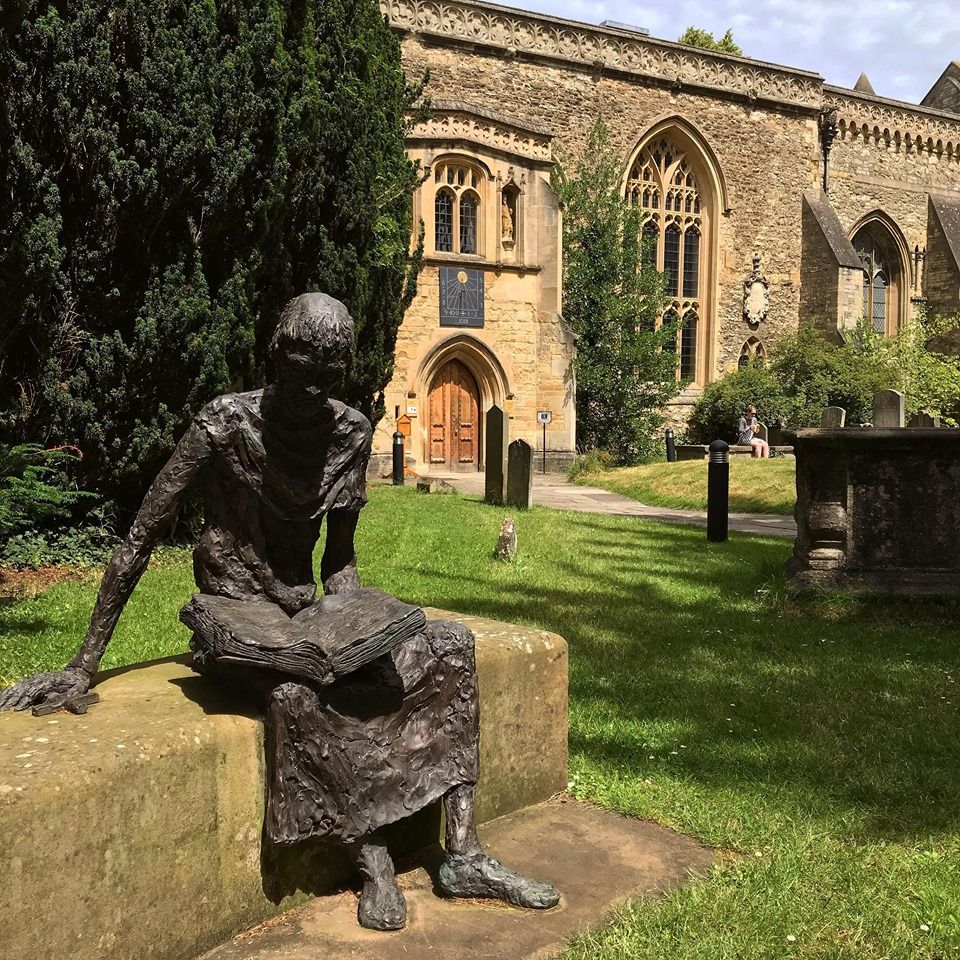St Edmund finds a new home
Light verse about the statue of St Edmund in St Peter-in-the-East

St Edmund finds a new home
Fallible himself, the sainted monk
(who’s normally in pious musings sunk)
has got himself into a dreadful funk
while sitting, an emaciated gnome
neglected near the church, his austere home.
His skin has broken open in the gloam
as if he’s whipped his body through the night
or found himself engaged in heavy fight.
And, which is worse than this ungainly sight,
all round him, strewn in piles upon the grass
are cigarette stubs, shards of broken glass
so sharp that nobody on earth could pass.
The Ball is over; no-one hears him moan.
His book lies open on its curve of stone.
He’s missed out on the fun. He’s all alone,
a spectre of himself who’s lost his tone.
But see! A wakeful student passing by
sits next to him, and looks him in the eye,
emitting, with these words, a mournful sigh:
‘I wonder if you’d give me some advice;
I’ve done something which isn’t very nice,
and need to be forgiven in a trice.
I did it at the Ball when drunk, you see;
what happened in the quad just had to be –
and now all I can feel is misery:
dry mouth, regret, a sore and pounding head,
no memory of what the Dean has said –
I’d frankly rather, now, that I were dead.’
The monk looks long and hard at the young man,
and shakes his troubled head, so thin and wan,
and wonders if this trouble’s in the plan:
‘I cannot help you, youth. I see the signs
in you of something I would call malign.
Nothing I say will cancel the Dean’s fine.
I heard, last night, cavortings in the quad,
carousals in the crypt, and Lord knows what.
You even stripped and shouted near the Bod!
It’s clear that learning in this place is dead;
debauchery has favour here instead.
Go to your room, and lie down on your bed.’
He pauses, then resumes with awful moan:
‘If I could move, I’d make the crypt my home
instead of this pedestrian-precinct stone
covered in pigeon-shit, vile student boke,
and disused canisters of diet coke –
not a fit seat for saints, or decent folk.’
The student, sunk into himself, looks sad
and shivers in the vest in which he’s clad.
Of course he knows that he’s been very bad –
but he has heard that, as advisors go,
this thin medieval saint is good to know
and nice to chat to when you’re feeling low.
Alas! Where’s all his fabled kindness now?
He wrings his hands, and sulks and (yes) he thinks;
then after a long while he starts, and blinks
among the beer-drenched peonies and pinks:
What’s this, what’s this? A great idea leaps
into his brain (where usually he keeps
a drunken vigil, or in torpor sleeps) –
and out he blurts it to the metal saint,
who trembles, looks as if he’s going to faint
at something quite so intricate and quaint;
but listens hard, and soon begins to smile
with pleasure he’s not shown in a long while
at finding that this youngster has some style.
‘How about I do a deal with you?’ says Ray
(that is the student’s name, I ought to say).
‘This is the dawning of a bright new day.
If you will grant forgiveness for my sins,
I’ll clear this mess away into the bins.
What’s not to like? The saintly ethos wins!
If you’ll give me indulgences for more
(a dozen sins, let’s say – make that a score)
I’ll move you to the crypt, where you can snore
for ever in your peaceful cave of stone,
untroubled by these sights which make you moan.
If you agree, let’s settle terms by phone.’
St Edmund raises up his withered hand,
salutes the youth, surveys the glass-strewn land,
summons the sleeping spirits of the band,
and in a thundering voice like crack of doom
shouts out his judgement in the drizzling gloom.
Ray sends his message on, from here to Frome:
‘The deal is done. I have been here too long.
My whipped tin-body’s going for a song,
and no-one cares that I am done such wrong.
This century’s long past its sell-by date
but you, young man, can alter its sad fate
by opening for me the dark crypt-gate.
I will not snore inside my cave of stone,
but I’ll be glad to pore over my tome
and ponder on God’s righteous will, alone.’
Ray mustered all his strength – no longer drunk,
no more in self-reproachful sadness sunk,
and (with a valiant effort) moved the monk,
who greatly liked his new niche underground –
a spiritual cavern without bound,
dark and un-visited by raucous sound.
The Dean, who happened to be passing by
on post-Ball rounds that drizzly day in May
stopped at the gate, and wondered why
the tin saint looked so happy by the font –
depressed no longer, as had been his wont,
but plump and cheerful, like a bon vivant.
He shrugged, rewarded Ray for his good deed,
and locked the crypt. ‘A job well done’, he said,
patting the youth, indulgent, on the head:
‘Who says you can’t negotiate with the dead?’
Photo credit: Kate Townsend